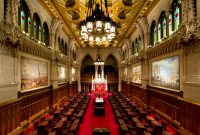Support strong Canadian climate journalism for 2025
For the first time in several years, Canada’s Upper Chamber will soon boast a full complement of Senators. Prime Minister Justin Trudeau has made an historical 21 appointments to the Senate in less than one year. Unlike past appointments, the newest Senators take their seats under the auspices of forming a non-partisan chamber. Such is Prime Minister Trudeau’s vision for a new Senate of Canada.
But how much of what's being peddled is true reform and how much is an exercise in public relations?
It’s time for a fact check on Senate modernization.
Let's start with recent claims that non-affiliated Senators are being hindered in their ability to be fully participating members of the Upper Chamber.
One such alleged roadblock is the supposed lack of committee spots being made available to non-affiliated Senators. The fact of the matter is, not only can any Senator take part in any committee at any time but an unprecedented number of committee spots have been allocated to non-affiliated Senators. What the non-affiliated Senators, and their chief spokesperson, Senator Harder (who continues to advocate for them, while simultaneously claiming he does not represent them), have failed to communicate to the public is that they have been unable to fill those spots.
Even though the Selection Committee typically only meets after prorogation, Conservatives and Senate Liberals agreed that with the influx of new Senators last year, it was only fair to reconvene the Selection committee to open up a minimum of two spots per committee for non-affiliated Senators, where they previously had no guaranteed spots. Unfortunately, the non-affiliated Senators have yet to fill three committee spots including one on Foreign Affairs and one on Official Languages. The obvious question is: How can you justify a request for more spots when you can’t fill those that have been allotted to you?
It also begs the question, when you are given more spots, what guarantee does the Senate have that those spots will be filled? Since non-affiliated Senators are not subject to caucus discipline, what mechanism is there to ensure attendance? If those spots are not filled, and the filled spots are left unattended, it is left up to the other Senators to carry the extra workload.
The Senate’s committee work has been lauded as extraordinary by almost anyone who has encountered it, in any capacity. Ensuring that these committees will remain high-functioning, productive and reputable is of the utmost importance to many senators. Keep in mind, it is the bipartisan nature of the Senate that has earned the Senate committees this reputation, not an illusion of nonpartisanship. Of course, with a changing Senate, the makeup of committees will have to be adjusted. However, we need to keep the integrity of the committees as a paramount consideration. Moving too quickly to appease non-affiliated senators, who have been disingenuous in their requests for more, is not the answer.
Another such alleged roadblock is the supposed lack of funds for non-affiliated Senators to carry out their work. The fact of the matter is, all non-affiliated Senators receive an additional $7000 directly to assist them in carrying out their duties and responsibilities that politically affiliated Senators do not receive.
Interestingly, one of the first things Senator Harder did upon being named Government Leader was request a funding increase. The decision to increase Senator Harder’s budget was approved by Internal Economy, the majority of whom are Conservatives and Senate Liberals, the so-called “old guard” who are supposedly uncomfortable with change and unwilling to relent their “power.”
Senators who are politically affiliated are not just open to change, but have been the architects of the meaningful reform that has happened in the Senate. Senate modernization has been ongoing for the past few years, long before the appointment of Justin Trudeau’s non-affiliated Senators.
A few of the changes we have made over the past few years include:
- An unprecedented move to make the Senate’s Internal Economy committee public. The committee oversees management of Senate expenditures and rules. The House of Commons Board of Internal Economy continues to meet in private.
- Adopting a new, more detailed proactive disclosure model of quarterly expenses, with a higher degree of clarity and transparency. Senators have been proactively disclosing expenses online since 2010.
- Implementing an independent, arm’s length oversight process to ensure that senators are not presiding in judgement over themselves and their colleagues on administrative disputes.
- Adopting one of the toughest Ethics and Conflict of Interest Codes in the Commonwealth, enforced by an independent ethics officer.
- The Senate has and continues to make changes to the Senate rules in light of the OAG’s report and Justice Binnie’s report.
There is still work to be done as we continue to navigate through the uncharted waters we find ourselves in.
For all the hoopla surrounding this so-called “new” appointments process, it is still the Prime Minister of the day who makes the decision on Senate appointees, as it should be. And while Prime Minister Trudeau’s appointees to date may not be card-carrying members of the Liberal Party of Canada, you will excuse my skepticism at the thought of them voting with their Conservative colleagues any time soon.
Don Plett is a Manitoba Senator who was appointed to the Senate in 2009 by Prime Minister Stephen Harper. He is a former president of the Conservative Party of Canada and is now Opposition Whip in the Senate and chair of the selection committee and chair of the advisory working group on administrative rules.




Comments